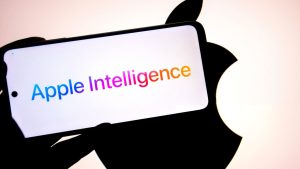Apple recently made waves by introducing its version of artificial intelligence, but interestingly, they’ve chosen to call it Apple Intelligence instead of simply AI. This isn’t just a clever marketing strategy, though that’s certainly part of it. There’s a much deeper rationale behind this naming convention that highlights a significant distinction between Apple’s approach to AI and that of other tech giants. Apple Intelligence, in essence, is not just artificial intelligence; it’s something far more personalized, private, and contextual.
In this blog, we’ll explore why Apple Intelligence represents a true departure from what we traditionally think of as AI, and how it promises to revolutionize not just smartphones, but an entire ecosystem of devices.
Why Apple Intelligence is Not Your Typical AI

When Apple announced its AI, many were quick to assume it was simply another player in the AI game. However, they’re deliberately calling it Apple Intelligence because it isn’t purely artificial intelligence. Yes, there are features that align with traditional AI—like the ability to summarize text, create custom emojis (called \”Geoi\”), or even generate images based on your input. These features are impressive and certainly fit the AI mold.
However, what sets Apple Intelligence apart is how it understands context—and more importantly, how it uses the vast amounts of data it already knows about you to provide more personalized suggestions and interactions.
Unlike other AI models such as OpenAI’s ChatGPT or Google’s Gemini, Apple’s system leverages data that is already stored across your Apple devices. This allows Apple Intelligence to provide more tailored recommendations because it knows you better than other AI platforms that are largely built on impersonal data sets or interaction prompts.
Apple Intelligence and Privacy: A Game Changer

One of the most critical aspects of Apple Intelligence—and a key differentiator from other AI platforms—is how it handles privacy. Apple has long positioned itself as a privacy-focused company, and this ethos is deeply integrated into how Apple Intelligence operates.
For starters, everything runs on-device. When you make a request to Apple Intelligence, the data stays on your iPhone, Mac, or iPad, and isn’t sent to the web or a third-party server. This is crucial for those concerned about where their personal data ends up. You can rest easy knowing that your data isn\’t being shared with advertisers or companies outside Apple’s ecosystem.
However, there may be instances where Apple Intelligence needs to reach out to a cloud server to process a more complex request. Even in these cases, your data remains safe because Apple employs end-to-end encryption. When this happens, your request is sent securely to a private cloud server, processed, and then the result is sent back to your device. What’s remarkable here is that after processing, all data on the server is immediately erased. There’s no lingering memory of your request—nothing is stored.
Apple has even gone a step further by releasing a public paper detailing their process, challenging researchers and technologists to find any holes in their privacy model. This level of transparency is rare in the tech world and provides users with even more confidence in the safety of their data.
Collaboration with AI Giants: The ChatGPT Connection

Interestingly, Apple is also partnering with some of the major players in the AI space, including ChatGPT. This might seem counterintuitive—after all, Apple is fiercely independent when it comes to its ecosystem—but this collaboration has a clear purpose.
When Apple Intelligence encounters a request it can’t handle directly, it can turn to ChatGPT for assistance. However, this doesn’t happen without the user’s explicit consent. You’ll be asked to approve the connection before any interaction takes place. This partnership is likely just the beginning, and we could see Apple team up with other AI leaders like Google’s Gemini or Microsoft’s Copilot in the future.
What makes this partnership particularly interesting is the potential for mutual benefit. While ChatGPT and other AI platforms require vast amounts of data to train their models, Apple has no shortage of data across its massive user base. It’s unclear whether there’s a financial arrangement between these companies, but what’s clear is that Apple Intelligence’s collaboration with external AI providers will ultimately benefit users by offering more comprehensive solutions.
Hardware Powering Apple Intelligence

One aspect that’s easy to overlook in this conversation is the hardware behind Apple Intelligence. As of now, Apple Intelligence is only available on the latest iPhone 15 Pro and iPhone 15 Pro Max, as these models are powered by the new A17 Pro chip. This chip, along with 8GB of RAM, is essential for running Apple Intelligence smoothly. Additionally, all Apple Silicon-based devices—meaning Macs and iPads with the M1 chip or newer—will also be able to run Apple Intelligence when it’s released.
The sheer number of compatible devices ensures that when Apple Intelligence goes live, millions of users will have instant access to it. This rapid adoption is something only Apple can achieve, given the size of its user base and the loyalty of its customers. It’s similar to when Apple removed the headphone jack from the iPhone 7—initially controversial, but quickly adopted across the industry. The impact Apple has on consumer technology is undeniable, and Apple Intelligence will likely follow a similar path of rapid adoption.
The Power of Apple’s Ecosystem

Perhaps the most exciting part about Apple Intelligence is its potential to leverage the full Apple ecosystem. Initially, Apple Intelligence will work across the iPhone, iPad, and Mac, but it won’t stop there. Eventually, it will likely integrate with your Apple Watch, AirPods, and even the Apple Vision Pro.
This ability to draw from multiple data sources—whether it’s your work habits on your Mac, your fitness data from your Apple Watch, or your daily use of your iPhone—will make Apple Intelligence incredibly powerful. No other tech company has this level of integration across such a broad spectrum of devices, and it gives Apple a distinct edge in building a truly personalized AI assistant.
Apple Intelligence has the potential to be the assistant we’ve always wanted—one that doesn’t just respond to prompts but anticipates needs, provides contextually relevant information, and integrates seamlessly across all the devices we use daily.
A Revolutionary Leap Forward
With Apple Intelligence, Apple isn’t just catching up with the competition—it’s setting a new standard for what AI can be. The combination of on-device processing, privacy-first design, and deep integration with Apple’s ecosystem makes this more than just artificial intelligence. It’s personalized intelligence designed to meet the needs of each individual user while keeping their data secure.
As Apple continues to roll out Apple Intelligence across its devices, we’re likely to see it evolve in ways that we can’t yet imagine. Given Apple’s track record of revolutionizing technology—whether through the iPhone, iPad, or Apple Watch—it’s safe to say that Apple Intelligence is just the beginning of a new era in AI.
Do you think Apple Intelligence will change the way we interact with technology? Feel free to share your thoughts in the comments!